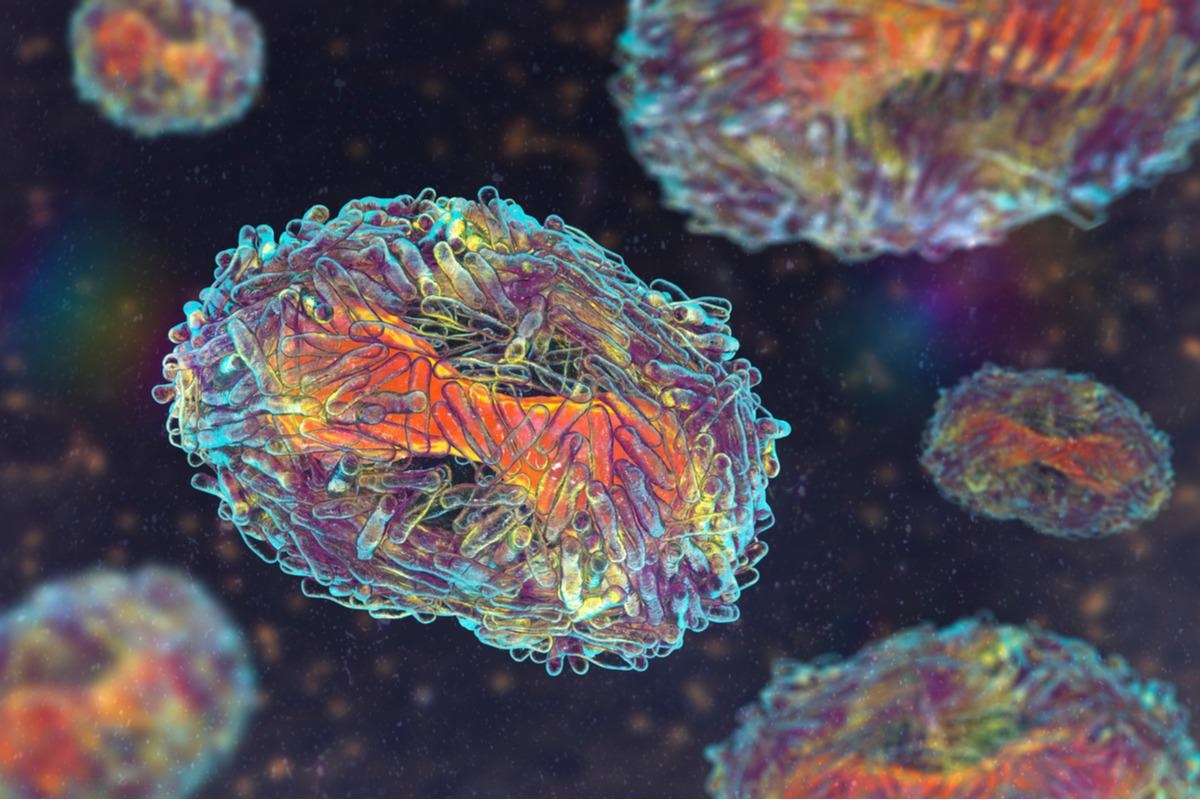In a recent study posted to the Research Square* preprint server, researchers characterized infections caused by the monkeypox virus (MPXV).
 Study: Multi-country outbreak of monkeypox virus: phylogenomic characterization and signs of microevolution. Image Credit: Kateryna Kon/Shutterstock
Study: Multi-country outbreak of monkeypox virus: phylogenomic characterization and signs of microevolution. Image Credit: Kateryna Kon/Shutterstock

 This news article was a review of a preliminary scientific report that had not undergone peer-review at the time of publication. Since its initial publication, the scientific report has now been peer reviewed and accepted for publication in a Scientific Journal. Links to the preliminary and peer-reviewed reports are available in the Sources section at the bottom of this article. View Sources
This news article was a review of a preliminary scientific report that had not undergone peer-review at the time of publication. Since its initial publication, the scientific report has now been peer reviewed and accepted for publication in a Scientific Journal. Links to the preliminary and peer-reviewed reports are available in the Sources section at the bottom of this article. View Sources
Monkeypox is caused by MPXV belonging to the Orthopoxvirus genus, which also comprises the variola virus, which causes smallpox. The natural reservoir of MPXv is unknown; however, rodents and non-human primates have been reported to harbor the virus, which could lead to viral spillover to humans.
About the study
In the present study, researchers used the high-throughput shotgun metagenomics to reconstruct the initial genomic sequences of the MPXV associated with the global monkeypox outbreak.
The team analyzed the first MPXV sequence related to the outbreak, which was released for public knowledge on 20 May 2022 by Portugal. The researchers also assessed the additional 15 MPXV genomic sequences released on the National Center for Biotechnology Information (NCBI) before 27 May 2022, with ten sequences sourced from Portugal and one each from the USA, Germany, France, Switzerland, and Slovenia.
The team subsequently identified the outbreak index case, taking into account the five to 21 days expected incubation period. The initial monkeypox cases were reported in various countries over three weeks after the first case was reported in the United Kingdom on 7 May 2022.
Results
The study results showed that the first genomic sequence of the MPXV outbreak belonged to the West African (WA) viral clade. This MPXV was commonly reported from Sierra Leone to western Cameroon and had a case-fatality ratio (CFR) of less than 1%, compared to MPXV from the Central African (CA) clade, which has a CFR of more than 10%.
The team noted that the MPXV sequenced in the outbreak clustered together, which indicated that the current monkeypox outbreak originated from a single source. The outbreak cluster for the infections caused in 2020 formed a divergent branch, which descended from a branch with viruses related to the exportation of MPXV from an endemic country to the United Kingdom, Singapore, and Israel in 2018 and 2019. This further had a genetic link to a large monkeypox outbreak in Nigeria from 2017 to 2018, which suggested that the monkeypox outbreak in 2022 resulted from recent importations of MPXV from an endemic country.
The team also found that the 2022 MPXV sequences differed by an average of 50 single-nucleotide polymorphisms (SNPs) from the 2018 and 2019 sequences. Such divergence indicated a recent evolutionary jump. Moreover, among the 46 SNPs that divided the 2022 MPXV sequence from the closest reference sequence of the virus, three of the amino acid substitutions were found in the immunogenic surface glycoprotein B21R.
Further analysis showed the first signs of the microevolution of MPXV during human-to-human transmission during the outbreak. The team found 15 emerging SNPs among the 15 outbreak sequences assessed in the study. Moreover, a sub-cluster of two sequences was identified that shared a frameshift deletion in a gene that codes for an ankyrin/host range.
Conclusion
Overall, the study findings showed the evolutionary course of the 2022 MPXV outbreak and highlighted the potential pathways that the virus targets for potent infections. The researchers believe that viral genome sequencing provided sufficient resolution to surveil the dynamics of viral transmission and the spread of the outbreak.

 This news article was a review of a preliminary scientific report that had not undergone peer-review at the time of publication. Since its initial publication, the scientific report has now been peer reviewed and accepted for publication in a Scientific Journal. Links to the preliminary and peer-reviewed reports are available in the Sources section at the bottom of this article. View Sources
This news article was a review of a preliminary scientific report that had not undergone peer-review at the time of publication. Since its initial publication, the scientific report has now been peer reviewed and accepted for publication in a Scientific Journal. Links to the preliminary and peer-reviewed reports are available in the Sources section at the bottom of this article. View Sources
Journal references:
- Preliminary scientific report.
João Paulo Gomes, Joana Isidro, Vitor Borges et al. Multi-country outbreak of monkeypox virus: phylogenomic characterization and signs of microevolution. Research Square. doi: https://doi.org/10.21203/rs.3.rs-1700947/v1 https://www.researchsquare.com/article/rs-1700947/v1
- Peer reviewed and published scientific report.
Isidro, Joana, Vítor Borges, Miguel Pinto, Daniel Sobral, João Dourado Santos, Alexandra Nunes, Verónica Mixão, et al. 2022. “Phylogenomic Characterization and Signs of Microevolution in the 2022 Multi-Country Outbreak of Monkeypox Virus.” Nature Medicine 28 (8). https://doi.org/10.1038/s41591-022-01907-y. https://www.nature.com/articles/s41591-022-01907-y.